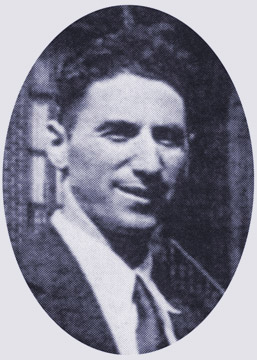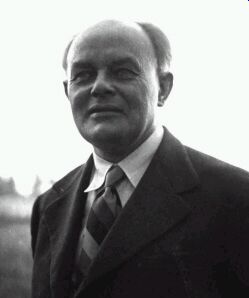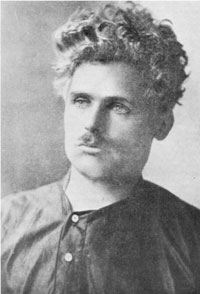History
In March 1937, The American Committee for the Defense of Leon Trotsky initiated the so-called Dewey Commission (officially the "Commission of Inquiry into the Charges Made against Leon Trotsky in the Moscow Trials"). The inquiry was named after its Chairman, John Dewey. Its other members were Carleton Beals, an authority on Latin-American affairs; Otto Rühle, biographer of Karl Marx and former member of the Reichstag; American journalists Benjamin Stolberg and Suzanne LaFollette (Secretary); Alfred Rosmer, who in 1920-21 had been a member of the Executive Committee of the Communist International; Wendelin Thomas, leader of the Wilhelmshaven sailors’ revolt in November 1918 and later a Communist member of the German Reichstag; Edward A. Ross, Professor of Sociology at the University of Wisconsin; former literary critic of The New York Times John Chamberlain, Carlo Tresca, Italian-American anarchist leader; and Mexican journalist Francisco Zamora. [3]
A sub-commission, comprising the first five commission members listed above, conducted thirteen hearings at Trotsky's home in Coyoacan, Mexico, D.F., from April 10 to April 17, 1937. Leon Trotsky was defended by the lawyer Albert Goldman. John Finerty acted as the commission's legal counsel. [3]
During the course of the "trial", committee member Mauritz A. Hallgren, formerly an editor of The Nation magazine, made headlines with a public resignation from the committee published in the pages of the New York Times. [4] Hallgren charged that the American Committee for the Defense of Leon Trotsky had "become an instrument of the Trotskyists for political intervention against the Soviet Union." [5] Hallgren's January 27, 1937, letter of resignation was later published as a 1-cent pamphlet by the Communist Party's International Publishers. [6]
Albert Einstein, although noting that Trotsky deserved the opportunity to prove his innocence, was critical of the Dewey inquiry: "The question is raised because Trotsky is an extremely active and adroit politician, who might well search for an effective platform for the presentation and promulgation of his political goals in the public sphere. . . . I'm afraid that the only result would be Trotsky's own self-promotion without the possibility of a well-grounded judgment." [7]
Conclusions of the inquiry
Following months of investigation, the Dewey Commission made its findings public in New York on September 21, 1937. [3] The commission purported to clear Trotsky of all charges made during the Moscow Trials and, moreover, exposed the scale of the alleged frame-up of all other defendants during these trials.
Among its conclusions, it stated that "the conduct of the Moscow trials was such as to convince any unprejudiced person that no effort was made to ascertain the truth. [3]
Max Shachtman was an American Marxist theorist. He went from being an associate of Leon Trotsky to a social democrat and mentor of senior assistants to AFL–CIO President George Meany.

Martin "Marty" Abern was a Marxist politician who was an important leader of the Communist youth movement of the 1920s as well as a founder of the American Trotskyist movement.
The Dewey Commission was initiated in March 1937 by the American Committee for the Defense of Leon Trotsky. It was named after its chairman, the philosopher John Dewey. Its other members were Carleton Beals, Otto Rühle, Benjamin Stolberg, and Secretary Suzanne La Follette, Alfred Rosmer, Wendelin Thomas, Edward A. Ross, John Chamberlain, Carlo Tresca, and Francisco Zamora Padilla. It was seen by some at the time, as Dewey feared it would be, as a Trotskyist front organization.

Alfred Rosmer was an American-born French Communist political activist and historian who was a leading member of the Comintern. Rosmer is best remembered as a political associate of Leon Trotsky and a memoirist.
George Novack was an American Marxist theoretician, editor, and activist.
Suzanne Clara La Follette was an American journalist and author who advocated for libertarian feminism in the first half of the 20th century. As an editor she helped found several magazines. She was an early and ardent feminist and a vocal anticommunist.

Karl Heinrich Otto Rühle was a German Marxist active in opposition to both the First and Second World Wars as well as a council communist theorist.

Albert Goldman (1897–1960) was a Belarusian-born American political and civil rights lawyer, closely associated with the American communist movement. Goldman broke with the mainline Communist Party, USA in 1933, joining the Trotskyist opposition, in which he would be a leading participant for the better part of the next two decades. Goldman is best remembered as a defendant and lead defense attorney in the 1941 Smith Act prosecution of the leadership of the Socialist Workers Party.
John Rensselaer Chamberlain was an American journalist, business and economic historian, syndicated columnist, and literary critic who was dubbed "one of America's most trusted book reviewers" by the libertarian magazine The Freeman.
Albert Glotzer (1908–1999), also known as Albert Gates, was a professional stenographer and founder of the Trotskyist movement in the United States. He was best remembered as the court reporter for the 1937 John Dewey Commission that examined the Stalinist charges against Trotsky in Mexico City and as a memoirist and activist in the social democratic movement in his later years.

Timofei Vladimirovich Sapronov was a Russian revolutionary, Old Bolshevik and socialist militant who was one of the leaders of the Left Opposition in the Communist Party of the Soviet Union.
Mauritz Alfred Hallgren was an American journalist, editor, and author. Hallgren is remembered as a leading liberal public intellectual of the 1930s, writing extensively on current affairs for The Nation magazine.
The Moscow trials were a series of show trials held by the Soviet Union between 1936 and 1938 at the instigation of Joseph Stalin. They were nominally directed against "Trotskyists" and members of the "Right Opposition" of the Communist Party of the Soviet Union.
- The "Case of the Trotskyite–Zinovievite Terrorist Center" ;
- The "Case of the Anti-Soviet Trotskyist Center" ; and
- The "Case of the Anti-Soviet 'Bloc of Rightists and Trotskyites'".

The Communist League of America (Opposition) was founded by James P. Cannon, Max Shachtman and Martin Abern late in 1928 after their expulsion from the Communist Party USA for Trotskyism. The CLA(O) was the United States section of Leon Trotsky's International Left Opposition and initially positioned itself as not a rival party to the CPUSA but as a faction of it and the Comintern. The group was terminated in 1934 when it merged with the American Workers Party headed by A. J. Muste to establish the Workers Party of the United States.
The Revolutionary Workers League (RWL) was a radical left group in the United States, lasting from 1935 through 1946. It was led by Hugo Oehler and published The Fighting Worker newspaper.

James Patrick Cannon was an American Trotskyist and a leader of the Socialist Workers Party.
Revolutionary socialism is a political philosophy, doctrine, and tradition within socialism that stresses the idea that a social revolution is necessary to bring about structural changes in society. More specifically, it is the view that revolution is a necessary precondition for transitioning from a capitalist to a socialist mode of production. Revolution is not necessarily defined as a violent insurrection; it is defined as a seizure of political power by mass movements of the working class so that the state is directly controlled or abolished by the working class as opposed to the capitalist class and its interests.

The following is a chronological list of books by Leon Trotsky, a Marxist theoretician, including hardcover and paperback books and pamphlets published during his life and posthumously during the years immediately following his assassination in the northern summer of 1940. Included are the original Russian or German language titles and publication information, as well as the name and publication information of the first English language edition.
Benjamin Stolberg (1891–1951) was an American journalist and labor activist.
Charles Malamuth was an American journalist, writer, and translator known as an "expert in Slavic languages," "Russian expert," and anticommunist. He is best known over the years as translator of Stalin: An Appraisal of the Man and His Influence by Leon Trotsky (1941) for which Soviet communists attacked him as a Trotskyite in the 1940s and Trotskyists attacked him as an anticommunist in the 2010s.
This page is based on this
Wikipedia article Text is available under the
CC BY-SA 4.0 license; additional terms may apply.
Images, videos and audio are available under their respective licenses.









